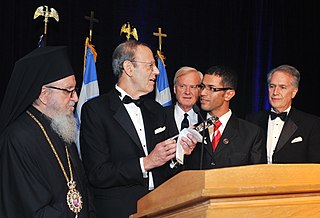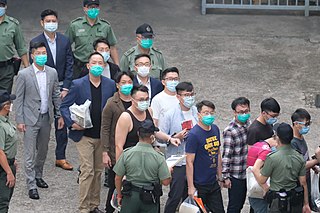
Human Rights Watch (HRW) is an international non-governmental organization headquartered in New York City that conducts research and advocacy on human rights. The group pressures governments, policymakers, companies, and individual human rights abusers to denounce abuse and respect human rights, and often works on behalf of refugees, children, migrants, and political prisoners.

Apple Daily was a Chinese-language tabloid published in Hong Kong from 1995 to 2021, with a digital-only English edition launched in May, 2020. Founded by Jimmy Lai and part of Next Media, Apple Daily was known for its sensational headlines, paparazzi photographs and pro-democracy, anti-CCP editorial position. A sister publication of the same name was published in Taiwan under a joint venture between Next Digital and other Taiwanese companies.

The National Endowment for Democracy (NED) is a quasi-autonomous non-governmental organization in the United States founded in 1983 to advance democracy worldwide, by promoting political and economic institutions, such as political groups, trade unions, free markets, and business groups.
Ideological debate over democracy in China has existed in Chinese politics since the 19th century. Chinese scholars, thinkers, and policy-makers have debated about democracy, an idea which was first imported by Western colonial powers but which some argue also has connections to classic Chinese thinking. Starting in the mid-eighteenth century, many Chinese argued about how to deal with Western culture. Though Chinese Confucians were initially opposed to Western modes of thinking, it became clear that aspects of the West were appealing. Industrialization gave the West an economic and military advantage. The Qing dynasty's defeats in the First and Second Opium Wars compelled a segment of Chinese politicians and intellectuals to rethink their notion of cultural and political superiority.

The International Republican Institute (IRI) is an American nonprofit organization founded in 1983 and funded and supported by the United States federal government. Most of its board is drawn from the Republican Party. Its public mission is to advance freedom and democracy worldwide by helping political parties to become more issue-based and responsive, assisting citizens to participate in government planning, and working to increase the role of marginalized groups in the political process, including women and youth. It has been repeatedly accused of foreign interference and has been implicated in the 2004 Haitian coup d'état. It was initially known as the National Republican Institute for International Affairs.

Hong Kong–United States relations are bilateral relations between Hong Kong and the United States.

Carrie Lam Cheng Yuet-ngor is a retired Hong Kong politician who served as the fourth Chief Executive of Hong Kong from 2017 to 2022, after serving as Chief Secretary for Administration for five years.

Samuel Chu Muk Man is a Hong Kong-born American activist and community organizer. Chu is the founder and President of The Campaign for Hong Kong, a US-based nonpartisan organization whose mission is to advocate for American leadership and policies that advance human rights and democracy in Hong Kong. He is also a founding member of the advisory board of the Axel Springer SE Freedom Foundation in Berlin (Germany), a senior advisor to the president and CEO of MAZON: A Jewish Response to Hunger, and a trainer for Midwest Academy, a training school for community organizers in the US.

Eric Chan Kwok-ki is a Hong Kong politician who is the incumbent Chief Secretary for Administration since 1 July 2022. He was also the secretary-general of the Committee for Safeguarding National Security (2020–2022). Previously, he served as Director of the Chief Executive's Office (2017–2022) and Director of Immigration (2011–2016).

The Hong Kong Human Rights and Democracy Act of 2019 (HKHRDA) is a United States federal law that requires the U.S. government to impose sanctions against mainland China and Hong Kong officials considered responsible for human rights abuses in Hong Kong, and requires the United States Department of State and other agencies to conduct an annual review to determine whether changes in Hong Kong's political status justify changing the unique, favorable trade relations between the U.S. and Hong Kong. The passage of the bill was supported by pro-democracy activists in Hong Kong, and in 2019 received near-unanimous support in Congress.
Kwok Wai-kin is a Hongkongese judge. He has sparked controversies over his political remarks on his hearings.

The Hong Kong national security law, officially the Law of the People's Republic of China on Safeguarding National Security in the Hong Kong Special Administrative Region is a national law of China on Hong Kong national security passed in 2020. It is implemented in Hong Kong in accordance with Hong Kong Basic Law Article 18, which allows for Chinese laws to be valid in Hong Kong if they are included in Annex III. It was formulated under the authorization of the National People's Congress decision on Hong Kong national security legislation. The law was passed on 30 June 2020 by the Standing Committee of the National People's Congress as a means of resolving the anti-extradition bill protests instigated by a Hong Kong local bill proposed in 2019 to enable extradition to other territories including the mainland, and came into force the same day.
In the subsequently postponed 2020 Hong Kong Legislative Council election, 12 opposition candidates were disqualified by the returning officers from running in the election, including four incumbent legislators, Alvin Yeung, Kwok Ka-ki, Dennis Kwok and Kenneth Leung, as well as activists Joshua Wong, Ventus Lau, Gwyneth Ho and Cheng Kam-mun and incumbent District Councillors Lester Shum, Tiffany Yuen, Fergus Leung and Cheng Tat-hung.

Executive Order 13936, entitled "The President’s Executive Order on Hong Kong Normalization", is an executive order signed by U.S. President Donald Trump on July 14, 2020. On the same day Trump had signed into law Hong Kong Autonomy Act, one of the laws from which the order derives authority. The act and the executive order are the U.S. response to the imposition of a controversial national security law in Hong Kong by the Standing Committee of the National People's Congress of China on June 30, 2020, which was described as "an unusual and extraordinary threat [...] to the national security, foreign policy, and economy of the United States" in the preamble.
The United States government applies economic sanctions against certain institutions and key members of the Chinese government and its ruling Chinese Communist Party (CCP), certain companies linked to the People's Liberation Army (PLA), and other affiliates that the US government has accused of aiding in human rights abuses. The US maintained embargoes against China from the inception of the People's Republic of China in 1949 until 1972. An embargo was reimposed by the US following the 1989 Tiananmen Square protests and massacre. From 2020 onward, the US imposed sanctions and visa restrictions against several Chinese government officials and companies, in response to the persecution of Uyghurs in China, human rights abuses in Hong Kong and Tibet, military-civil fusion, support for the Russian invasion of Ukraine, and fentanyl production.

The offices of Apple Daily, once the largest pro-democracy newspaper in Hong Kong, and its parent company, Next Digital, were raided and executives arrested by the Hong Kong Police Force on 10 August 2020 and again on 17 June 2021. Some of the arrested and three companies of Next Digital were charged under the Hong Kong national security law. The 26-year-old newspaper was forced to close in June 2021 following the raids and freezing of its capital.
Stand with Hong Kong ("SWHK"), an abbreviation of the official name "Fight for Freedom. Stand with Hong Kong.", is an independent grassroot political organisation dedicated to fighting for freedom of Hong Kong. Co-founded during the 2019-20 Hong Kong protests by a group of anonymous Hongkongers worldwide, it aims to rally the international community to support Hongkongers in their fight for democracy. Some of its major campaigns include a global rally across 15 countries in August 2019 and a sanction report in November 2019 in response to the Hong Kong Human Rights and Democracy Act.

The Hong Kong 47 are a group of 47 pro-democracy advocates in Hong Kong charged with conspiracy to commit subversion under the Hong Kong national security law.

The Summit for Democracy is a virtual summit hosted by the United States "to renew democracy at home and confront autocracies abroad". The first summit was held on December 9–10, 2021. The three themes are defending against authoritarianism, addressing and fighting corruption, and advancing respect for human rights. Contradictory to its themes, multiple un-democratic and authoritarian nations have attended, which has attracted criticism.
The Global Financial Leaders' Investment Summit is a annual Hong Kong-based financial summit organised by the Hong Kong Monetary Authority (HKMA). The inaugural event took place in November 2022.














